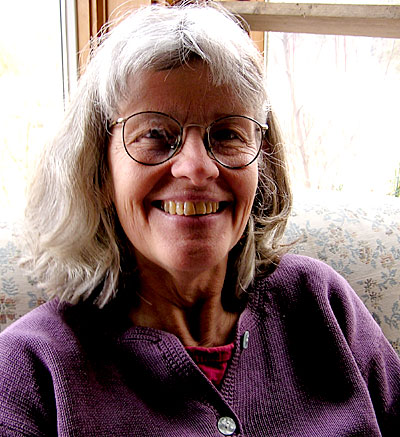 |
| Karen Volckhausen. English photo. |
Karen Volckhausen:
Not Just a Tourist
by Marada Cook
Karen Volckhausen began her volunteer work on vacation. “We took a two-week trip with our husbands to Guatemala, in 1992,” said close friend Peggy Strong, “We went to all the usual tourist sites, but it was meeting the people that really sparked our interest – especially Karen’s.”
When Karen and Paul Volckhausen returned home to Orland, Maine, they decided it was time to cultivate sustainability beyond the borders of their Happy Town Farm. “We got involved with the Bangor Sister City Project,” Karen said, “and were inspired by their sistering work in Carasque, El Salvador.” Empowered by the success of the Bangor project, the Volckhausens brought the idea of an organizational sistering project to Russell Libby and MOFGA’s board of directors. In January 2000, the first agricultural delegation went to Carasque to seek common ground in El Salvador.
“None of us knew Spanish in 1992,” said Strong, who went with the delegation in 2000. Volckhausen took it upon herself to learn the language. “She has amazed everyone with her dedication and perseverance,” said Strong.
Those traits have served Karen well over the past 25 years. “We’ve been MOFGA members for a long time,” she said, “and I guess we’ve always been involved.” Paul Volckhausen is a past MOFGA president, has coordinated traffic and parking at the Common Ground Country Fair, and both Karen and Paul have been active members of MOFGA’s Hancock County Chapter. After all this, she says she’s “found her mission in MOFGA” with the El Salvador sistering project.
“We visited a lot of places, some sophisticated, some not,” said Karen, “Overall, I really valued being in solidarity with all these peasant farmers struggling to survive. We have a lot we can learn from them, and a lot we can teach.” The delegation returned to El Salvador in January 2003, and last September a group of Salvadoran farmers and organizers arrived in the United States to teach, visit and represent their country’s small farms at the Common Ground Fair.
“They were amazed at how clean the Fair was, and we were all surprised how similar our situations are,” said Karen, “My role is to be a communicator – to read, write and speak their language.” She translates the goals of the sistered organizations, making it clear that despite their climatic differences, their missions are parallel.
The MOFGA-El Salvador Sistering Project has a lot of work pending: It would like to create solidarity between small farmers in both countries, swap information and publications, promote tours and visits, and support and learn from each other’s organizing efforts.
“We also want to support them in their quest for organic certification,” Karen said, “and help them find markets for their products. They grow extraordinary coffee, bananas, coconuts, pineapples and papayas, which they sell fresh and dried. They process indigo in a nontoxic way.”
The project is also interested in facilitating work exchanges eventually. “We’re looking to build participation in the project,” said Karen, “whether that means on the committee, the delegation, or as a visitor.” She realizes the value of her volunteer work – she left on vacation, and returned not with a suitcase of souvenirs, but “una mision para crear el cambio” – a mission to create change.
